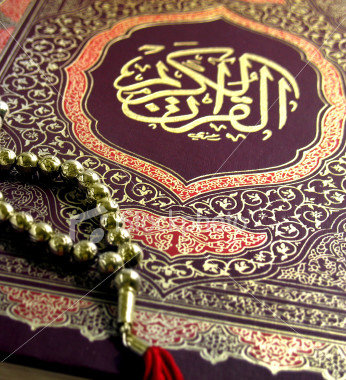Posts Tagged ‘The Holy Quran’
- In: Islam | Quran
- 2 Comments
How to Seek Benefit in Your Recitation of Qur’an

Is it that you hold your Mushaf, are reciting from it and yet your mind is wandering from the food in the fridge to the weather outside? You’re unaware of what you are articulating and can’t just focus? Read the rest of this entry »
- In: All | Allah الله | Islam | Islam News | MC-Islam | MC-Quran | Miracles of Allah | Miss-Conception | Prophet Muhammad [pbuh] | Prophets | Quran | Satan/Shaitan/Jinn | Special Islamic Reminders
- 1 Comment
Quran a Book of Peace, Not War, Scholars Say

“The Quran is saying to humans, this is the final guidance from your Creator, for the specific purpose of worshipping him and creating a civil society where you can live in peace with one another,” says Muslim scholar Imam Sulayman S. Nyang of Howard University in Washington, D.C.
Muslims around the world rely on the Quran for guidance, says Nyang. Devout followers heed the call to prayer five times each day and recite passages from the holy book. Muslims believe that the Quran is God’s unfiltered message—teaching them how to lead a good life and become a better, more moral person.
“The Quran is very specific with regard to the nature of human struggle, because in order for a human to be at peace with himself, they must control their baser instincts,” says Nyang.
The quest to control base instincts such as greed, lust, and cruelty and to seek spiritual purity is known by Muslims as the “great jihad.” Featured widely in the Quran the “great jihad” is a person’s most important internal struggle.
Nyang quotes Chapter 3, verse 172, of the Quran “Of those who answered the call of Allah and the messenger, even after being wounded, those who do right and refrain from wrong have a great reward.”
But also in the holy scripture is a reference to “lower jihad,” a more earthly and physical—and controversial—struggle. “To those against whom war is made, permission is given [to fight] because they are wronged; and verily, God is most powerful for their aid,” quotes Nyang.
This verse speaks of combat or war to be waged against one’s oppressors—a struggle sanctioned by God.
But the Quran also states in Chapter 2, Verse 190: “Fight in the cause of Allah those who fight you, but do not transgress limits; for Allah loves not transgressors.”
The essence of the verse, Nyang says, is to fight back “if you are attacked by your persecutors, but don’t fight back indiscriminately. Follow the rules of engagement.” According to mainstream Muslim clerics, those “rules of engagement”‘ are explicit: women, children, and innocent civilians are off limits.

Perversion of Text
Muslims believe the prophet Mohammed received these revelations directly from God some 1400 years ago. It was at a time when he and other Muslims were being driven from their homes, persecuted, and killed. But although the Quran advocates self-defense, its most prevalent message is one of peace and brotherly love.
“If people are intent on using religion to motivate terror or violence, they’ll find an excuse there no matter what the actual text says,” says David Rodier of American University in Washington, D.C., who is an expert on the world’s religions. Like the Quran, he says, most holy scriptures are filled with stories of war and warriors, and these images have been used throughout history by some members of every faith to justify bloodshed.
“Religion, after all, speaks to our most basic and ultimate convictions, and if you are wanting to use violence, if you can find a religious justification, then you can find a very powerful motivation,” says Rodier.
Christians have killed in the name of God, as have Hindus, Buddhists, Jews, and others. But it is Muslims who have most recently been accused of turning “divine commandments” into a divine license to kill.
Terrorists have often said they are striking out against their enemies and oppressors “in the name of Allah.” But many Islamic scholars say such terrorists are not only violating the spirit of the Quran, but the letter of it as well.
“You do not kill innocent people, you do not cheat, you do not lie, you do not destroy any property of other human beings,” says Imam Abdullah Khouj, an Islamic scholar and director of the Islamic Center, in Washington, D.C.
The attacks on the World Trade Center and the Pentagon “can’t be in the name of Allah,” he adds.
“Violation of Allah’s Wishes”
Islamic scholars interviewed by the TV news show National Geographic Todayagreed that terrorists such as Usama bin Laden and his supporters are fanatics using Islam to further their own worldly causes.
“In order for them to generate support beyond their small group, they have to latch onto universal symbols, and this is where Islam becomes a target of convenience for them,” says Nyang
People combine pieces of verse from the Quran and use it to justify their actions, says Khouj. “But to understand the full meaning of the verse,” he says, “you have to read the one before it, the one after it, maybe five to six verses to get the full picture.”
The “full picture” of Islam and the Quran, say Khouj and Nyang, is captured by Chapter 5, Verse 32: “[I]f anyone slew a person—unless it be for murder or spreading mischief in the land—it would be as if he slew the whole people. And if anyone saved a life, it would be as if he saved the life of the whole people.”
For most Muslims, the callous and indiscriminate taking of human life violates Allah’s wishes. It defies the Quran central message and undermines the peace that Islam promises to deliver to all people.
“Human life in Islam is extremely sacred,” says Khouj. “We’re not talking about just Muslim [life], but human life in general.”
This article was excerpted from a one-hour special, “The Geography of Crisis,” aired by the TV news show National Geographic Today on September 25 at 8 p.m. EST.


 [post this Article on your facebook wall,and share with friends.click above “Share” button …]
[post this Article on your facebook wall,and share with friends.click above “Share” button …]


[where ever you post,please add source link.either in website or even in facebook NOTE…please….spread the link of site..]

![]() Note:I’d love to see who visit my website,your views about website. Click here to leave your feedback.
Note:I’d love to see who visit my website,your views about website. Click here to leave your feedback.

- In: All | Allah الله | Islam | Quran
- 2 Comments
What the Qur’an teaches: The same old faith
His are the keys of the heavens and the earth. He gives abundant sustenance, or gives it in scant measure to whomever He wills. He has full knowledge of everything. In matters of faith, He has ordained for you the same as He had enjoined on Noah — that which We have revealed to you (Muhammad) — and as We enjoined on Abraham, Moses and Jesus:
‘Steadfastly uphold the faith and do not divide into factions.’ Hard for the idolaters is that which you call on them to accept. God draws to Himself whoever He pleases and guides to Himself everyone who turns to Him. (Consultation, Al-Shoora: 42: 12-13)
We discussed the verses that make clear that judgment in all people’s disputes belong to God alone. Given that He makes His judgment final in all disputes, this can only mean that this rule is based on the fact that having originated the heavens and the earth and set their laws in operation, He continues to hold their keys: “His are the keys of the heavens and the earth.”
Since mankind are only part of what lives in the heavens and earth, the same fact applies to them, which means that the keys and treasures of the universe belong to God. Moreover, it is He who provides them with sustenance, determining its measure in the same way as He conducts all affairs: “He gives abundant sustenance, or gives it in scant measure to whomever He wills.” It is He who gives them the food they eat and the water they drink, providing everything they need in their lives. Can they, then, refer to anyone else for judgment in their affairs? It is the most natural procedure for people to turn to the One who controls all this according to His perfect knowledge: “He has full knowledge of everything.” Needless to say, the One who knows everything is the One who can make a final judgment in all fairness.
This is just one example of how the meanings of the component parts of the surah’s verses converge in complete harmony and perfect subtlety to work on the human heart. It is akin to the harmonious tones that combine to make a superb melody.
The surah began with a general reference to the unity of the source of all divine faiths: “Thus has God, the Almighty, the Wise, sent revelation to you, Prophet, and to those who preceded you.” (Verse 3) Now it gives more details of this fact, pointing out that the legislation God has enacted for Muslims is, in essence, the same as He legislated for Noah, Abraham, Moses and Jesus, requiring them all to establish the divine faith and not to split into factions over it. This requires that they, in turn, steadfastly pursue the divine code of living, paying no heed to the desires of those who fall into dispute. This divine faith is thus meant to govern human life, while those who argue about God have no leg to stand on. They are the ones who are warned of the painful punishment they might incur.
This passage enjoys the same level of perfect harmony as the preceding one: “In matters of faith, He has ordained for you the same as He had enjoined on Noah — that which We have revealed to you (Muhammad) — and as We enjoined on Abraham, Moses and Jesus: Steadfastly uphold the faith and do not divide into factions.”
Thus the surah confirms the truth we explained at its very outset: God is the source of all divine religions, starting far back in history. A little touch is added here which has a pleasant, subtle effect on every believer. He or she looks out to see who were their predecessors on this long line only to find that they were those noble elite: Noah, Abraham, Moses, Jesus and Muhammad (peace be on them all). Every believer then realizes that he has joined their procession, traveling the same way they traveled. He will then enjoy his journey along that way, no matter how much trouble, persecution or deprivation he suffers. Who would not put up with trouble, knowing that it is only transient, when he is assured of the company of such an elite nobility?
Moreover, there is a profound sense of peace between believers in the one divine faith who implement His law. No conflict or dispute arises between them. They feel their strong bond urging them to collaborate and understand each other so that they can maintain the link between present and past.
Since the religion God ordained for the Muslims who believe in Muhammad is the same as He enjoined on Noah, Abraham, Moses and Jesus, why do the followers of Moses and Jesus fight against each other? Indeed, what causes fighting between the followers of different Christian sects? Why do the followers of Moses and Jesus go to war against the followers of Muhammad? And why do those idolaters who claim to follow Abraham’s faith wage a war against Muslims? Should not all these group together under the one banner hoisted by God’s last Messenger? The same order was issued to them all: “Steadfastly uphold the faith and do not divide into factions.” Only when they unite under this banner do they uphold the faith, fulfil its duties, maintain its path and work under the same banner hoisted high in succession by Noah, Abraham, Moses and Jesus until it was eventually carried by Muhammad, who received the final testament.


 [post this Article on your facebook wall,and share with friends.click above “Share” button …]
[post this Article on your facebook wall,and share with friends.click above “Share” button …]


[where ever you post,please add source link.either in website or even in facebook NOTE…please….spread the link of site..]

![]() Note:I’d love to see who visit my website,your views about website. Click here to leave your feedback.
Note:I’d love to see who visit my website,your views about website. Click here to leave your feedback.

- In: Islam
- 2 Comments

How Do You Benefit From the Qur’aan
Ibn al-Qayyim, Source: Al-Fawaa’id
Ibn Al-Qayyim (rahimahullaah) said in al-Fawaa’id:
Allaah the Exalted said:
Verily, therein is indeed a reminder for him who has a heart or gives ear while he is heedful. (Qaaf 50:37)
When you desire benefit from the Qur’an, then bring your heart together during its recitation, listen heedfully and have the presence of the one who is being addressed and spoken to, since it is a speech from Him, the Sublime, to you, upon the tongue of His Messenger (sallallaahu alaihi wasallam).
This is because the best and most complete effect is suspended between the following:
1. That which produces the required effect,
2. A place which receives this effect,
3. The condition which is necessary to receive such an effect and
4. The absence of that which prevents this effect from being obtained.
This verse has included all of the above with the most concise and clear of wording, which is most direct in expounding the intended meaning.
His speech: (Verily, therein is indeed a reminder…) is an indication of what has preceded from the beginning of Surah Qaaf to the present and this constitutes that which produces the desired effect.
And His speech: (…for him who has a heart…) this is the place which receives the effect and what is desired by it is: a living heart which understands from Allaah, just as the Exalted has said:
It is but a Reminder and a Manifest, Clear Qur’an, that he (Muhammad) may give warning to him who is alive (i.e. the healthy and live heart of the believer.) ( YaaSeen 36:69-70)
And His speech: (…or who gives ear…) the one who directs his listening and the perceptive faculty of his hearing to what is being said to him, and this is the condition of benefiting and receiving the desired effect from the words (that one hears).
And His speech: (…while he is heedful) meaning his heart is present and witnessing, not absent and unmindful.
Ibn Qutaibah said: “Listen to the Book of Allaah, while your heart and understanding are present, not while you are unmindful and forgetful.”
And this is an indication of that which prevents the desired effect [from the Book of Allaah] from being obtained and that is the forgetfulness and absence of the heart from understanding what is being said to it, looking at it with care and pondering slowly and carefully over it.
So when that which produces the effect and that is the Book of Allaah; a place which receives the effect and that is the heart; the necessary condition, which is paying attention; the absence of that which prevents the effect and that is the hearts occupation and distraction away from the meaning of the speech and its turning way to something else are all present, then the effect will be obtained and realized and that is benefiting from the Qur’an and its remembrance.


 [post this Article on your facebook wall,and share with friends.click above “Share” button …]
[post this Article on your facebook wall,and share with friends.click above “Share” button …]


[where ever you post,please add source link.either in website or even in facebook NOTE…please….spread the link of site..]

![]() Note:I’d love to see who visit my website,your views about website. Click here to leave your feedback.
Note:I’d love to see who visit my website,your views about website. Click here to leave your feedback.

Ahad [ أَحَد ]- The One and Only
Posted on: March 5, 2009
- In: All | Allah الله | Islam | Quran
- Leave a Comment
أَحَد
The One and Only.
Fourteen hundred years ago, when people asked the Prophet Muhammad (s.a.a.w.), who is your Lord. The answer came in the following verse of the Holy Quran:
قُلْ هُوَ اللَّهُ أَحَدٌ
Say: “He is Allah, the One and Only. (The Holy Quran, Surah Al-Ikhlas, Ayah 1, 112:1)
The scholars have explained the sentence Huwa-Allah Ahad syntactically, but in our opinion its explanation which perfectly corresponds to the context is that Huwa is the subject and Allahu its predicate, and Ahad-un its second predicate. According to this parsing the sentence means: “He (about Whom you are questioning me) is Allah, is One and only one. Another meaning also can be, and according to language rules it is not wrong either: “He is AIIah, the One.“
Here, the first thing to be understood is the unusual use of ahad in this sentence. Usually this word is either used in the possessive case as yaum ul-ahad (first day of the week), or to indicate total negative as Ma ja a a-ni ahad-un (No one has come to me), or in common questions like Hal `indaka ahad-un (Is there anyone with you?), or in conditional clauses like Inja’a-ka ahad-un (If someone comes to you), or in counting as ahad, ithnan, ahad ashar (one, two, eleven). Apart from these uses, there is no precedent in the pre-Qur’anic Arabic that the mere word ahad might have been used as an adjective for a person or thing. After the revelation of the Qur’an this word has been used only for the Being of Allah, and for no one else. This extraordinary use by itself shows that being single, unique and matchless is a fundamental attribute of Allah; no one else in the world is qualified with this quality: He is One, He has no equal.
Then, keeping in view the questions that the polytheists and the followers of earlier scriptures asked the Holy Prophet (upon whom be peace) about his Lord, let us see how they were answered with ahad-un after Huwa-Allah.
First, it means: “He alone is the Sustainer: no one else has any share or part in providence. and since He alone can be the Ilah (Deity) Who is Master and Sustainer, therefore, no one else is His associate in Divinity either.”
Secondly, it also means “He alone is the Creator of the universe: no one else is His associate in this work of creation. He alone is the Master of the universe, the Disposer and Administrator of its system, the Sustainer , of His creatures, Helper and Rescuer in times of hardship; no one else has any share or plan whatever in the works of Godhead, which as you yourselves acknowledge, are works of Allah.
Thirdly since they had also asked the questions: of what is your Lord made? what is His ancestry? What is his sex? From whom has He inherited the world and who will inherit it after Him? -all these questions have been answered with one word ahad for AIIah.
It means:
(1) He alone has been, and will be, God for ever; neither was there a God before Him, nor will there be any after Him;
(2) there is no race of gods to which He may belong as a member: He is God, one and single, and none is homogeneous with Him;
(3) His being is not merely One ( wahid but ahad, in which there is no tinge of plurality in any way: He is not a compound being, which may be analysable or divisible. which may have a form and shape, which may be residing somewhere, or may contain or include something, which may have a colour, which may have some limbs, which may have a direction, and which may be variable or changeable in any way. Free from every kind of plurality He alone is a Being Who is Ahad in every aspect. (Here, one should fully understand that the word wahid is used in Arabic just like the word “one” in English. A collection consisting of great pluralities is collectively called wahid or one, as one man, one nation, one country, one world, even one universe, and every separate part of a collection is also called one. But the word Ahad is not used for anyone except Allah. That is why wherever in the Qur’an the word wahid has been used for Allah, He has been called Itah wahid (one Deity), or Allah-ulWahid-al-Qahhar. (One Allah Who is Omnipotent), and nowhere just wahid, for this word is also used for the things which contain pluralities of different kinds in their being. On the contrary, for Allah and only for Allah the word Ahad has been used absolutely, for He alone is the Being Who exists without any plurality in any way, Whose Oneness is perfect in every way. (Tafheemul-Quran)














































 Oh Allah,Please Forgive me
Oh Allah,Please Forgive me Ex-Christians-Now Muslim,Alhamdulillah
Ex-Christians-Now Muslim,Alhamdulillah I Love My Prophet Muhammad s.a.w
I Love My Prophet Muhammad s.a.w
















![Fake Grave of Prophet Muhammad [pbuh]](https://islamgreatreligion.files.wordpress.com/2009/07/prophet_muhammad_pbuh_tomb4.jpg)


















Recent Comments